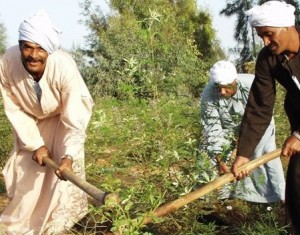Financial Times | 17 June 2009
By Heba Saleh in Cairo
A piano stands in the corner of the hall where the management and workers hold meetings at the Sekem farm in the Nile Delta, about an hour’s drive northeast of Cairo.
It is an unusual sight in a country where culture is often seen as a luxury to be enjoyed only by the well-off, and pianos are not found much outside schools, theatres and places of entertainment in the main cities.
But the Sekem Group, Egypt’s foremost producer and exporter of organic food to Europe and the US, is not a typical Egyptian enterprise.
“Every day our workers are exposed to some artistic activity,” said Helmy Abouleish, the managing director of the group, and the son of founder and current chairman, Ibrahim Abouleish whose vision of organic agriculture and human development lie at the heart of the company.
Established in 1977, the Sekem Group now produces and processes in its organic farms and factories some 280 products ranging from natural pharmaceuticals to herbs, spices, eggs, honey, vegetables, juices and legumes. It also grows organic cotton and has an export-oriented textile business.
Turnover last year was $45m. The local market accounted for 55 to 60 per cent of sales, with exports making up the rest. Sekem’s products are found in European health food shops under various brand names, and they are also sold under the labels of well-known supermarket chains.
The Sekem Group farms directly 6,000 acres, but it also buys in the output of another 5,000 acres dotted around Egypt and owned by private farmers who are members of its Egyptian Biodynamic Association, a non-governmental-organisation providing training, outreach and support to organic cultivators.
“We buy from the farmers for fixed prices, and we give them a justified price,” says Helmy Abouleish. “We have a fair trade certificate and farmers can rely on us to provide security and an income. They also see that organic methods make for healthy plants.”
The Abouleish family owns 60 per cent of the business and other shareholders include Triodos Bank, a Netherlands-based ethical investment institution, and GLS Bank, a German social and ecological bank.
Sekem workers and their families benefit from access to healthcare and educational facilities provided by the company. There is also a vocational training centre and a programme of cultural activities. Farm workers gather in a large circle every morning so that each can speak briefly of their plans for the day while fostering a sense of community and shared purpose.
Mr Abouleish says he is pleased that sales to the Egyptian market have been growing in the last three years. While the company’s organic vegetables can cost up to twice their non-organic equivalents, putting them beyond the means of most Egyptians, other products are only marginally more expensive. But Mr Abouleish believes that sustainable agriculture with its emphasis on reducing carbon emissions and water and energy use will ultimately make it more competitive.
Sekem, he argues, uses no chemical fertilisers which halves its carbon and energy footprint.
“If you have this in mind, then in a changing world, who will be more competitive?” he says.
“We have to be in Egypt and prove that organic farming can feed the world and provide a livelihood for every farmer. From this perspective, it is important to produce local awareness.”
Plans focus on further expansion in Egypt and regionally by bringing more acreage under cultivation. Sekem has also established companies in Sudan and Uganda to find land for organic farming.












